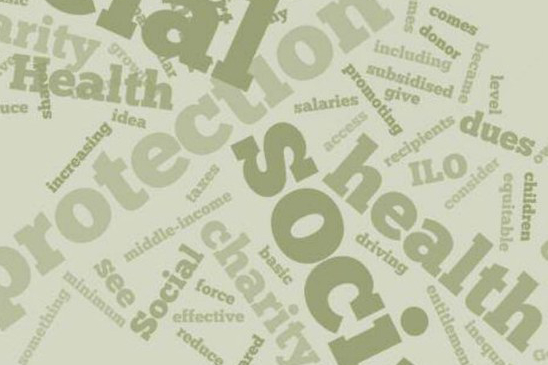The idea of charity is still omnipresent in thinking about international assistance. The word ‘donor’ is a witness of that: some countries ‘donate’ or give; they do not see themselves as owing something to other countries or their inhabitants; nor do they see themselves as partners in a shared effort.
Charity once was a driving force of what became social protection. It no longer is. Social protection is not about charity. When we pay our taxes or social insurance fees, we are not donors of aid, we are paying our dues; when we receive support in the form of subsidised health care or teachers for our children whose salaries have been paid, we are not recipients of aid. We pay our dues and we use our entitlements, and we consider it a collective effort to build a fair and equitable society. That is solidarity, not charity
There is a growing consensus that effective public social protection schemes are essential to reduce health and other social inequalities. Since many years and with increasing support from the wider United Nations family, the International Labour Organisation (ILO) promotes a Social Protection Floor: a minimum level of social protection, including basic income and access to essential social services, to be provided by all countries. When it comes to health in particular, Germany and France, with the ILO and the World Health Organisation (WHO) developed the “Providing for Health” or P4H initiative, promoting social health protection in low- and middle-income countries. The United Kingdom considered to establishing a Centre for Progressive Health Financing to promote tax-based social health protection. What the above-mentioned efforts have in common – so far rather unfortunately – is that they do not intend to apply the principles of social protection – solidarity, not charity – at the global level. They try to promote permanent redistribution of income within countries, not between countries.
The idea of applying the principles of social protection that exist between people living in the same country to people living in different countries may seem odd, but has a precedent. When confronted with the HIV/AIDS epidemic, the international community accepted that health is a global issue that requires mutual and shared responsibility beyond borders. Even if some countries were (and still are) too poor to provide AIDS treatment, and will rely on international assistance during decades to come, the international community decided to support the provision of AIDS treatment to all people who needed. As that required international assistance during many decades, it could not rely on charity – it had to be based on solidarity. Thus, the creation of the Global Fund to fight AIDS, Tuberculosis and Malaria can be seen as the beginning of a new paradigm of global social protection. However, an approach tackling only three diseases is inadequate for redressing health inequalities in the longer term, and furthermore intrinsically contradictory with the idea of solidarity: if we work together for a fair and equitable global society, sharing particular health risks cannot be the basis for solidarity – not if it comes at the detriment of other health risks that are not shared.
Can we imagine a funding mechanism for Global Social Protection between people living in different countries, relying on each other and supporting each other, contributing to a fair and equitable global society? – medico international and the Hélène de Beir Foundation can. We think that most people can adhere to the principles of Global Social Protection. We do not aim for a global social protection scheme that replaces national social protection schemes; we think that national social protection schemes will benefit from a global scheme. We think we can learn from social protection equalisation schemes, like they exist within and among many high-income countries (Australia, Belgium, Canada, Germany, and others). Particularly the German “Risikostrukturausgleich” that balances economic gaps within the social health insurance system, and the “Länderfinanzausgleich” among the federal states, are of interest.
The objective of a three days expert workshop on Financing Global Social Protection is to challenge the metaphorical devil in the detail. We know we must move from global charity to global solidarity.
The question is: how?

